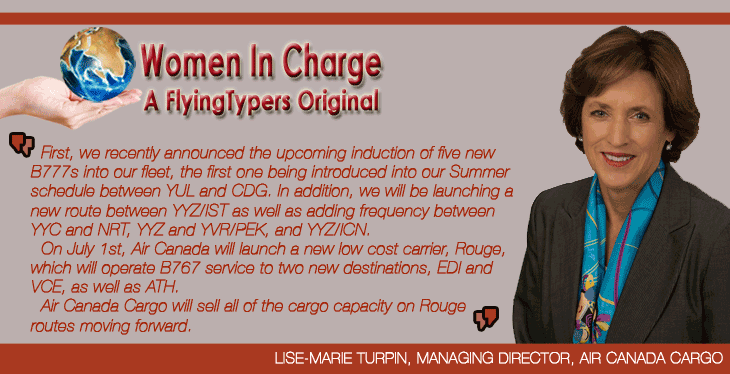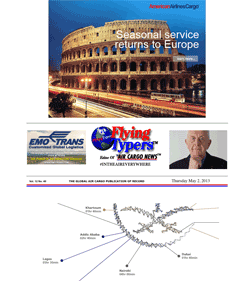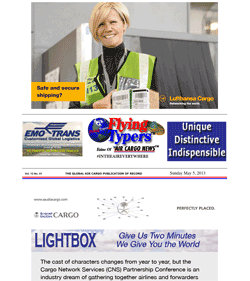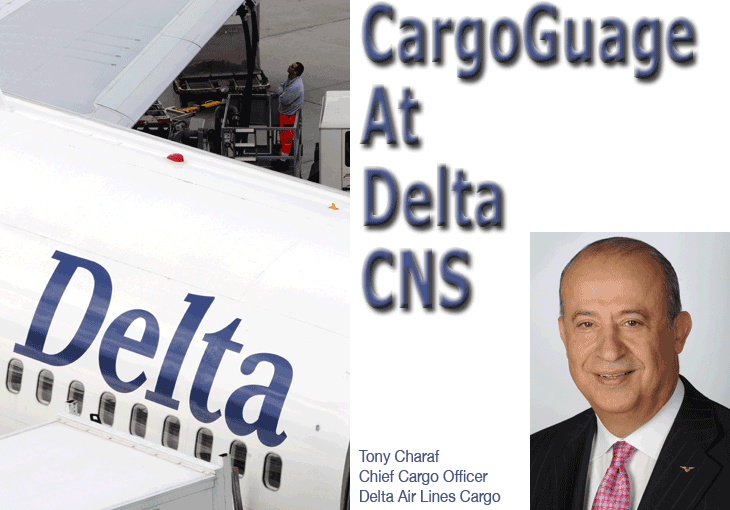
“When
you consider the weakened state
of the global economy, we are
pleased with our financial performance
in the first quarter.
“Delta
Cargo held its own.
“We
are making good progress against
many of our goals for the year,
including market penetration
for e-air waybill.
“There
has been positive feedback and
good customer response to the
launch of our dedicated website,
www.deltacargo.com. ”
Tony
Charaf, top executive at Delta
Cargo, has seen all of this
once before. And no, it was
not in a dream!
Once
upon a time he held the exact
same position.
Well
maybe twice is the charm, but
whatever the tea leaves may
say, Tony is up on his toes
at the task of living the dream
whilst taking Delta Cargo all
the way to the top.
“Most
of the primary markets are performing
much as we expected.
“Our
domestic U.S. performance is
strong, while markets in Europe
and Asia are challenged.
“Latin
America continues to be a positive
story.
“Moreover
volumes are good and CTMs are
stable, however the market environment
for pricing remains weak.
“Excess
capacity remains a concern.
“While
we were happy overall with our
first quarter results, we saw
a softening in the marketplace
in April, with our CTM’s
down about 3 percent year over
year.
“Looking
forward, if I may use a nautical
analogy in Arizona, the waters
remain turbulent, and the outlook
is somewhat uncertain.”
“But
being where you want to be comes
into view at this point, because
right now we are on-track against
our goals, which is certainly
positive considering the sluggish
state of many of the global
economies.”

“We
are excited about the freight
potential thanks to new international
wide body service between Seattle
and Shanghai, Seattle and Tokyo-Haneda,
and between Detroit and Beijing.
“Here
in the U.S., we have added transcontinental
service with wide-body pallet-capable
aircraft between JFK and Los
Angeles and JFK and Seattle.
“Delta
will also be adding 88 Boeing
717-200 aircraft, primarily
to replace 50-seat regional
aircraft.
“This
move will provide additional
capacity, which will be very
important for cargo, especially
with our focus on growing U.S.
mail and our small-package express
revenues.
“First
of the 717s will be in service
during autumn of 2013.”

“Technology
will continue to be a major
focus for Delta Cargo.
“As
mentioned at the top, we launched
our updated website, deltacargo.com,
in December, and we will be
adding enhanced user features
as part of a second phase later
this year.
“We
are growing the booking capabilities
with our e-freight initiative,
where we continue to lead the
industry.
“Delta
joined the IATA multilateral
eAWB agreement last month.
“Along
with Swissair, we were the first
airline to join, which demonstrates
our commitment to leading the
industry in this area. “

“A
major process improvement that
we’ve just launched in
Atlanta is our Cargo Logistics
Manager. CLM, which is an industry
first among passenger airlines,
connects our scanning technology
to our existing Webvision cargo
platform.
“CLM
enhances our cargo ops team
real-time visibility in one
centralized location to all
the freight, including US Mail,
coming into or leaving Atlanta.
“After
CLM is piloted in Atlanta, we
expect to roll it out to other
stations later this year.
“Leading
our laser focus on strong operational
performance is Scott Barkley,
managing director for Global
Cargo Operations.
“Scott
joined the team last August
from our Airport Customer Service
division.
“He
is a strong leader with a team
approach and great rapport with
people. “Scott is directing
our goal of building a metrics-driven
operation.”

“We
believe that the round of consolidations
we’ve seen—United
and Continental and American
and US Airways—are a positive
development that will help strengthen
the industry as a whole.
“This
applies to the cargo as well
as the passenger side of the
business.”

“The
various conferences and trade
shows that the industry sponsors
give all of us the chance to
hear from our customers and
keep up with trends in the market
place.
“I
think the participation we’ve
had this year speaks to the
value the industry places on
these events.
“For
example, this year’s Boston
Seafood Show set a record for
attendance.
“We
are looking forward to some
of the major events later this
year, including Air Cargo Europe
in June, the two in October,
the Produce Marketing Association
and the National Funeral Directors’
Association event and Air Cargo
Americas in Miami.”

“We
live and work in a global economy,
so the international markets
are very important to us and
our future.
“Delta’s
global network connects the
major producing regions and
primary economies of the world.
“This
means that we can serve our
customers from anywhere to everywhere
to support their shipping needs.
“Additionally,
serving this diversity of markets
around the world allows us to
weather economic weaknesses
in any one area.
“North
America business is a significant
portion of our overall cargo
business and we are fully committed
to supporting our customers
and growing our business in
this important region.
“With
our new transcontinental widebody
service, some of the key flows
in the U.S. are between Atlanta
and the Northwest with mixed
product lines and a lot of seafood.
“The
upcoming salmon season in Alaska
will start later this month
and carry us through the summer.
“We
will operate 757s from Anchorage
to SLC and MSP for onward distribution.
“The
strong perishables season, notably
cherries, will also be starting
this month in California and
moving up the West Coast to
Washington.
“All
indications are that this is
a strong year for cherries and
other fruits.
“Air
cargo is the shipping solution
for these time-sensitive perishable
products, and Delta has the
network and the processes in
place to ensure that they arrive
on time and in good order.
“Our
DASH express small package product
is doing very well for us.
“DASH
touches many products including
biomedical supplies, vaccines,
medications, plus blood and
human organs.
“These
products go everywhere within
the U.S. via our strong domestic
network with widebodies, many
of which are pallet capable.”

“Our
key markets out of Atlanta include
LAX, SFO, SEA, SLC, JFK, and
DTW.
“The
exciting news this year is that
we are truly connecting our
gateways with widebody pallet-capable
service timed to make connections
around the globe.
“Our
summer schedule is starting
up and will add more destinations
and frequencies.”

“In
general the domestic market
is flat right now, but it remains
strong. Mail is a large and
still-growing component of our
business.
“Latin
America continues to be a top
growth market for us, on the
passenger as well as cargo sides
of the business.
“Between
2011 and 2012 we increased our
capacity to South America by
5 percent.
“Brazil
is a good example.
“During
the past five years Delta has
grown its capacity there by
56 percent, and passenger traffic
has increased 62 percent.
“In
Sao Paulo we offer service to
three gateways—Atlanta,
JFK, and Detroit—all with
widebody pallet-capable service.
“Last
year marked 15 years of uninterrupted
service to Brazil, which means
we have been a consistent, reliable
partner for shippers there.
“Delta
Cargo plays a significant role
in Delta’s overall strategy,
and the company remains committed
to the cargo operation.
“We
have an extensive global network
with abundant cargo capacity;
we are focused on operational
excellence; and Delta has the
financial strength and resources
to remain a viable partner to
the cargo industry.
“With
our extensive global network
Delta’s cargo capacity
affords us an incredible customer
offering with speed and efficiency.
“For
example, Delta carries more
cargo today from Japan than
we did in 2009 when we operated
freighters in that market.
“We
are a passenger airline, but
one with an essential belly
component that makes cargo an
integral part of Delta’s
corporate business model.”
Geoffrey/Flossie
|



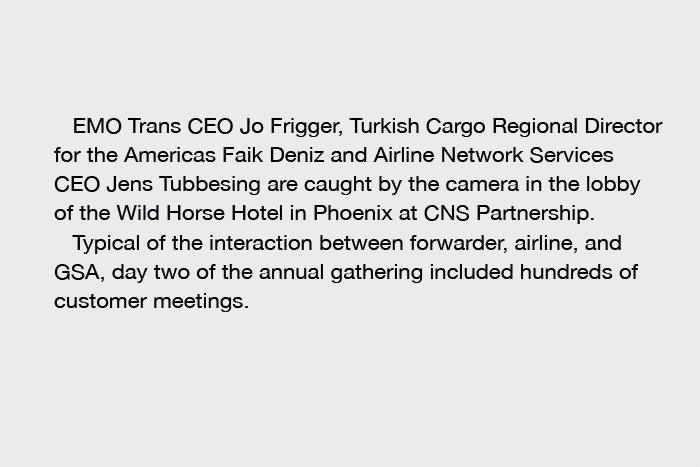



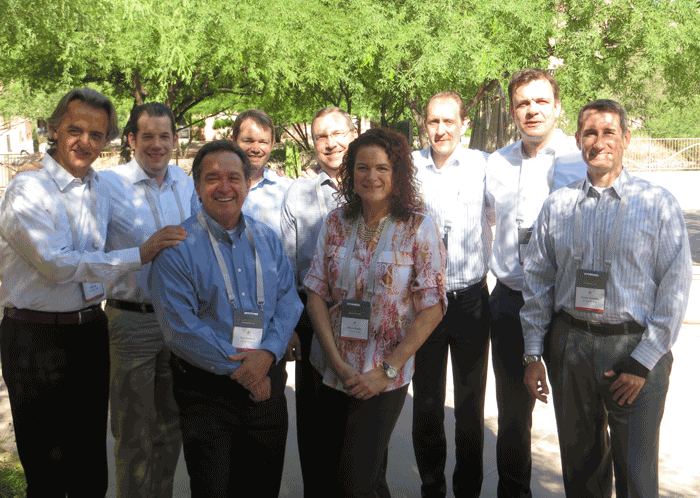 CNS
Is A Breeze . . . “We
assembled the key managers
from our team all in
one place at CNS, to
greet our partners and
potential clients, and
delivered access to
a variety of specialists
while saving time for
everyone.”—Achim
Martinka
CNS
Is A Breeze . . . “We
assembled the key managers
from our team all in
one place at CNS, to
greet our partners and
potential clients, and
delivered access to
a variety of specialists
while saving time for
everyone.”—Achim
Martinka 

